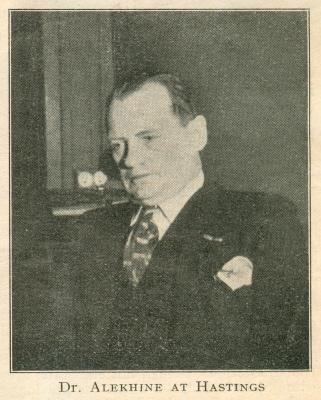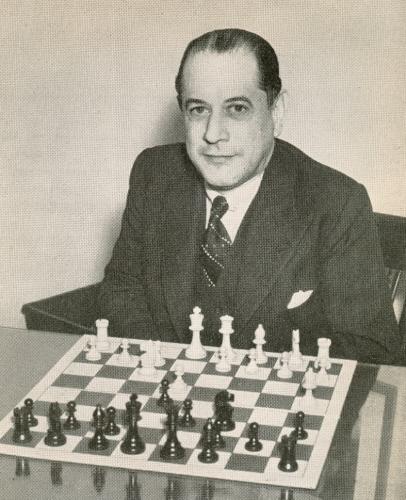Chess Explorations (41)
By Edward Winter
Peter Zahner (Thalwil, Switzerland) requests information about the old masters’
voices. Aware of the widely-disseminated BBC interview with Alekhine, he wonders
whether other sound recordings of masters from the pre-Botvinnik era can be
heard anywhere.
To begin with that Alekhine interview, we believe that the complete recording
first appeared on the Internet in May 2003, at the Chess Café. It is still available,
with a transcript, in that site’s archives.
The exact occasion of the interview is uncertain, but Alekhine’s last
words were:
‘And now soon I am off with my wife for South America to arrange for
the next world contest to be held there.’
It is therefore relevant to note the following on page 50 of the February 1938
BCM:
‘Dr Alekhine stayed at Hastings during the congress and was an interested
spectator. Afterwards he spent some days in London and appeared in the television
programme on 12 January.
He is now at home in France, but will shortly leave for South America ...’
And from page 190 of CHESS, 14 February 1938:
‘Dr Alekhine was televised by the British Broadcasting Corporation
in January, “lookers-in” seeing him make, once again, the move
which regained for him the world’s championship.
... On 4 February he sailed for South America ...’
The possible connection between the interview and the television broadcast
is currently unclear.

The above photograph was published on page 49 of the February 1938 BCM.
The topic of sound recordings was first raised in Chess Notes 25 years ago.
Dale Brandreth (Yorklyn, DE, USA) wrote in C.N. 938:
‘Alekhine was on the radio during his California visit in 1932,
though I have never actually heard any of the interviews. Does any reader
know of any studios that might have such audio records that could be obtained
for a fee? I should like to piece together a few of the old-timers for a short
tape. Of course, for Alekhine and Euwe there must be something available still
in Holland during the time of their great matches in 1935 and 1937. For Lasker
and Capa there should be something available too, perhaps at Nottingham, 1936.’
Even today, however, recordings are tantalizingly elusive, although there is
no shortage of reports. The following appeared on pages xvii-xviii of the Nottingham,
1936 tournament book edited by W.H. Watts:
‘The Nottingham tournament was exceptional in yet another respect.
The British Broadcasting Corporation suddenly became aware of the existence
of the game of chess and agreed to give broadcasts on the opening and closing
days of the tournament. The chief speakers on each occasion were A.J. Mackenzie,
the controller, and Alderman Derbyshire, but Dr Max Euwe, Señor Capablanca
and R.H.S. Stevenson also spoke.
There were also several broadcasts direct from the University buildings to
Holland by Dr Euwe and others, and because of the keen interest in the tournament
shown in Russia, there was a regular telephone service with Moscow, and the
controller was actually interviewed over the telephone by the “Moscow
Evening News”.’
A dozen photographs from Nottingham, 1936 were given in C.N.
4935. Below is another one (Euwe v Botvinnik), culled from page 301 of Alt
om Skak by B. Nielsen (Odense, 1943):

C.N. 6303 mentioned an earlier broadcast of a different kind, as reported in
the New York Times of 17 August 1932 (sports section, page 20) in connection
with Pasadena, 1932:
‘Before the tournament got under way several of the competitors were
taken aloft in the dirigible Volunteer. Kashdan and Dake contested an informal
game, with Dr Alekhine acting as referee. The result, which was a draw by
repetition of moves, was broadcast from the airship by Dr Alekhine, who expressed
the hope that chess might be studied in the schools.’
In C.N. 960 Rob Verhoeven (The Hague, the Netherlands) pointed out reports
published in the Tijdschrift van den Nederlandschen Schaakbond in the
1930s of Lasker, Capablanca and Alekhine on Dutch radio. He gave us these details:
- 2 November 1933: Alekhine was interviewed by Euwe;
- 20 April 1935: Lasker gave a talk, in Dutch, for VARA, the subject being
chess in Russia;
- 6 October 1935: Alekhine was interviewed by Straat;
- 9 October 1935: Capablanca was interviewed by Straat;
- 23 October 1935: Lasker was interviewed by Bomli, in Dutch;
- 30 October 1935: Flohr was to interview Alekhine’s second, Salo Landau.
Below is an item from page 267 of the October 1935 issue of the Dutch magazine:

Mr Verhoeven also informed us that on 25 March 1985 the Dutch radio programme
Man en Paard included recordings of Euwe, Alekhine (speaking in German)
and Fine (Dutch). The original had been broadcast in 1937 at the end of the
Euwe-Alekhine world championship match. More information on that material is
sought, and we also hope that it will be possible to find items in connection
with AVRO, 1938 (AVRO being a broadcasting organization). Page 24 of the tournament
book by Erich Carl (Berlin-Charlottenburg, 1988) has a photograph from Algemeen
Handelsblad of 28 November 1938 showing Keres and Fine being interviewed
by a reporter holding an AVRO microphone.
Earlier radio broadcasts on chess tended not to feature leading players. In
a discussion on the first broadcast, the following quotes were given in C.N.s
2266 and 2552:
From page 274 of the July 1923 BCM:
‘At the invitation of the British Broadcasting Company, Mr B.G. Laws
on Saturday, the 16th ult., broadcast a short paper “The Art of the
Chess Problem”, as an experiment. This included the presenting of three
popular graceful problems selected to encourage likely students, at the same
time entertaining and instructing those who already are interested. This is
the first occasion in the history of chess that the medium of broadcasting
has been used to popularize the subject.’
The event was also reported on page 135 of the July-August 1923 American
Chess Bulletin, which quoted from The Times:
‘Music, the drama, art, politics, news, all have their place in broadcasting
programmes, and now that chess has entered the portals it is to be hoped it
has come to stay. Marconi House might keep its eye on such meetings as that
of the British Chess Federation, for if the plea be justified that musical
excerpts have resulted in a greater number of people booking seats for the
various operas, then the interests of the oldest game in the world are well
worth its consideration.’
Another quote from around the same time comes from page 9 of the January 1924
American Chess Bulletin:
‘According to the Minnesota Daily Star, in which J.M. Juran
conducts a chess column, Dr E.E. Munns of Minneapolis broadcasted a talk on
chess over the radio on 15 December, urging encouragement of the games at
school and in the home. He also gave a short discussion on the theory of the
game and included some of Dr Emanuel Lasker’s maxims. Finally, he read
a letter from Frank J. Marshall, United States champion.’
An article on pages 113-114 of the Chess Budget, 23 January 1926 began:
‘At last the British Broadcasting Co. have become aware of the fact
that there is such a game as chess and that there are a large number of people
in this country who take an interest in it.’
It referred to presentations on the radio by Tinsley and V. Menchik, but complained
that Great Britain was far behind Germany, for example, where at least two stations
were giving chess talks and lessons. (Page 125 of the 30 January 1926 issue
of the Chess Budget specified that it ‘was not Mr E.S. Tinsley,
the chess editor of The Times, who gave the wireless exposition of chess
– but his brother, Mr S. Tinsley’. Vera Menchik’s radio engagement
was briefly mentioned on page 53 of the February 1926 BCM.)
As regards Germany, C.N. 4702 asked whether any recordings had survived of
the 1920s programmes which occasioned the book Radio-Schach by Edmund
Nebermann (Berlin and Leipzig, 1926). No details have come to light so far.

There is evidently much research still to be undertaken. The greatest prize
of all, we feel, would be to discover recordings of the chess lectures which
Capablanca broadcast, in Spanish, on RCA shortly before his death. Transcripts
were serialized in Ajedrez Español as from the January 1943 issue, and
an English version appeared in book form 23 years later.

José Raúl Capablanca
Submit information
or suggestions on chess explorations
All ChessBase articles
by Edward Winter
 Edward
Winter is the editor of Chess
Notes, which was founded in January 1982 as "a forum for aficionados
to discuss all matters relating to the Royal Pastime". Since then, over 6,600
items have been published, and the series has resulted in four books by Winter:
Chess
Explorations (1996), Kings,
Commoners and Knaves (1999), A
Chess Omnibus (2003) and Chess
Facts and Fables (2006). He is also the author of a monograph
on Capablanca (1989).
Edward
Winter is the editor of Chess
Notes, which was founded in January 1982 as "a forum for aficionados
to discuss all matters relating to the Royal Pastime". Since then, over 6,600
items have been published, and the series has resulted in four books by Winter:
Chess
Explorations (1996), Kings,
Commoners and Knaves (1999), A
Chess Omnibus (2003) and Chess
Facts and Fables (2006). He is also the author of a monograph
on Capablanca (1989).
Chess Notes is well known for its historical research, and anyone browsing
in its archives
will find a wealth of unknown games, accounts of historical mysteries, quotes
and quips, and other material of every kind imaginable. Correspondents from
around the world contribute items, and they include not only "ordinary readers"
but also some eminent historians – and, indeed, some eminent masters. Chess
Notes is located at the Chess
History Center. Signed copies of Edward Winter's publications are
currently available.























 Edward
Winter is the editor of
Edward
Winter is the editor of 




